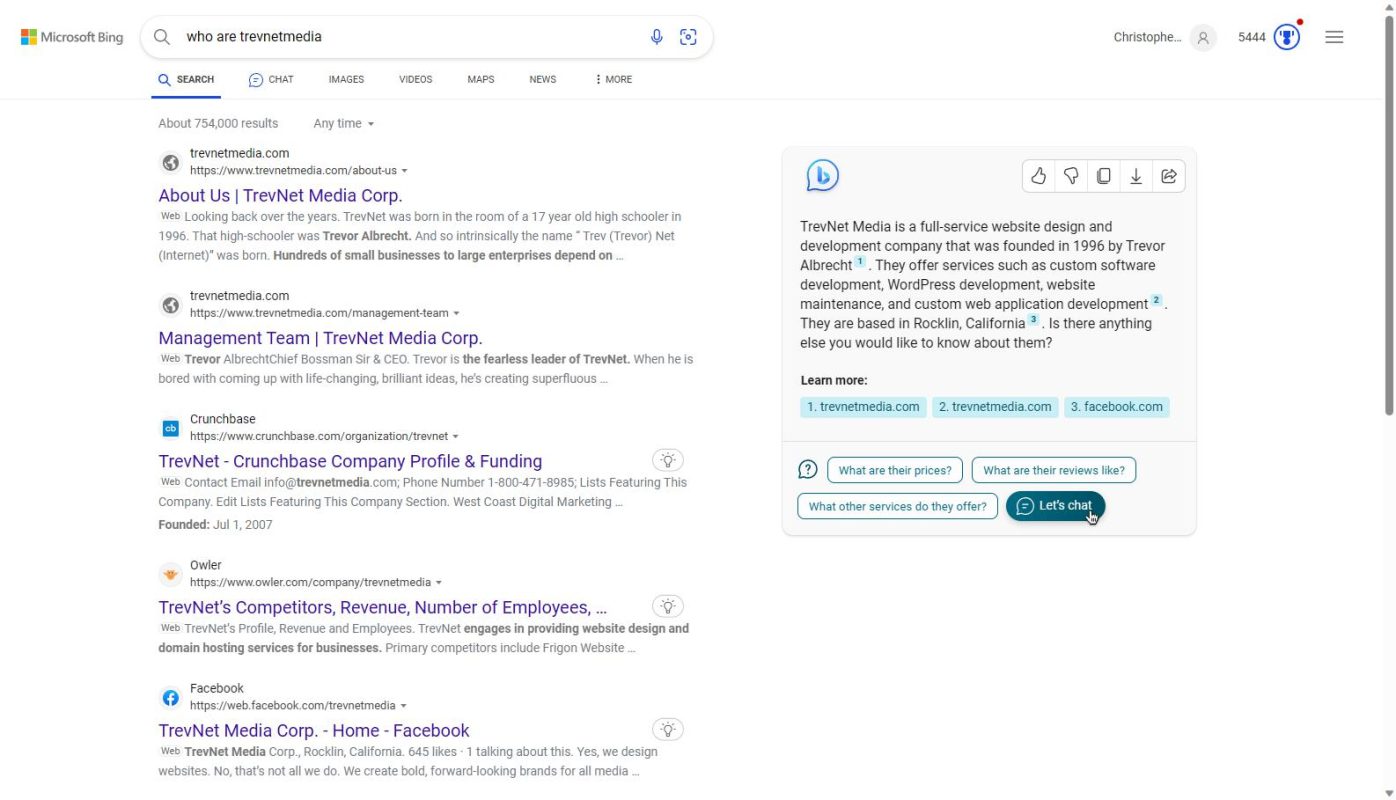As search engines like Bing and Google continue to adopt and integrate AI into their search results, the impact on SEO is becoming increasingly apparent. With AI results being included in search results, users may no longer need to visit the website from which the content came.
This shift towards AI-driven search results has the potential to change the way businesses approach SEO. Instead of focusing solely on traditional SEO tactics such as keyword optimization and backlinking, businesses may need to start considering how their content can be optimized for AI algorithms.
The integration of artificial intelligence (AI) into search engines is poised to redefine the landscape of Search Engine Optimization (SEO) in several fundamental ways. As search engines like Bing and Google continue to adopt and integrate AI into their search results, the way users interact with search results and the websites that provide those results is set to change.
Microsoft recently launched an AI-powered Bing search engine and Edge browser, heralding what they call a “copilot” for the web. This new Bing experience comes with a slew of AI-powered features designed to streamline the search process and provide more comprehensive, relevant results to users. A few highlights of Bing’s new features include an improved search experience, complete answers to queries, an interactive chat experience for more complex searches, and even the ability to generate content to help inspire users in various contexts. For example, it can help you write an email or create an itinerary for a vacation. Notably, this new Bing version cites all its sources, giving users access to links to the web content it references.
The new Microsoft Edge experience comes with updated AI capabilities and a new look. This includes new functionalities such as chat and compose. For instance, you can ask for a summary of a lengthy financial report and get the key takeaways, and then use the chat function to ask for a comparison to a competing company’s financials and automatically put it in a table3.
The new Bing experience is a culmination of four technical breakthroughs:
- Next-generation OpenAI model: This new version of Bing is running on a new, next-generation OpenAI large language model that is more powerful than ChatGPT and customized specifically for search. It is faster, more accurate, and more capable.
- Microsoft Prometheus model: This is a proprietary way of working with the OpenAI model to better leverage its power.
- Applying AI to the core search algorithm: This has led to the largest jump in relevance in Bing’s search results in two decades.
- New user experience: Bing is reimagining how users interact with search, browser, and chat by unifying them into a single experience.
Microsoft and OpenAI have also been working on implementing safeguards to defend against harmful content, addressing issues such as misinformation and disinformation, content blocking, data safety, and preventing the promotion of harmful or discriminatory content.
Google’s incorporation of generative AI into its search engine is aimed at transforming the user’s search experience and potentially reshaping the field of Search Engine Optimization (SEO). These changes have significant implications for SEO, and here are a few key points to consider:
- Contextual and Conversational Searches: With generative AI, Google is attempting to make the search process more intuitive and comprehensive. For example, when a user asks a complex question, the AI-powered search engine will provide a snapshot of key information along with links to delve deeper into the topic. This shift towards a more contextual and conversational search could impact SEO by prioritizing content that provides clear, comprehensive answers to complex queries.
- AI-Powered Shopping Experience: The integration of generative AI with Google’s Shopping Graph will provide users with a more detailed and holistic picture when shopping. This includes offering relevant, up-to-date reviews, ratings, prices, and product images SEO strategies for e-commerce sites may need to focus more on these aspects to ensure visibility in these AI-powered search results.
- Featuring a Wide Range of Voices and Sources: Google’s new search experiences are designed to highlight a variety of content on the web, which underscores the importance of unique, insightful content for SEO. Furthermore, Google continues to prioritize the distinguishability of ads from organic search results, implying that organic SEO remains crucial in the new generative AI search landscape.
- Responsible Approach and Quality Control: Google’s generative AI approach comes with quality checks and limitations to maintain a high standard of search results. These include measures such as limiting the types of queries where the AI capabilities will appear, and enabling users to evaluate the corroborating information for themselves. This indicates that the relevance and quality of content will still play a crucial role in SEO.
- Search Labs and Feedback Incorporation: Google is launching its generative AI search capabilities as an experiment called SGE (Search Generative Experience) in Search Labs. The company plans to incorporate feedback to improve the user experience over time. This suggests that the impact on SEO may evolve as the technology and user behavior change over time.
In conclusion, while generative AI is set to bring about significant changes to Google’s search engine, the core principles of SEO – relevance, quality, and user focus – are likely to remain integral to achieving visibility in search results. However, understanding and adapting to these changes will be crucial for SEO professionals and digital marketers in the future. The integration of AI into search engines is set to have a significant impact on SEO. Businesses that adapt to these changes and optimize their content for AI algorithms are likely to see improved search rankings and increased visibility in search results.


